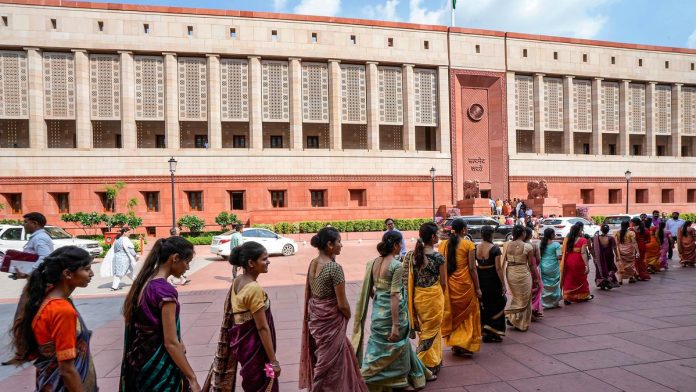– Anwarulhaq Baig
New Delhi, Sept. 21, 2023: Questioning the intention and timings of the Modi government behind the introduction of the Women’s Reservation Bill, Muslim leaders and organizations have called for the inclusion of Other Backward Classes (OBCs) and Muslim women.
Hot discussions are underway in the Rajya Sabha on the 128th Constitution Amendment Bill, which seeks to reserve one-third of the seats for women in the Lok Sabha and the State Legislative Assemblies. After tabling the bill by the BJP-led government, the Lok Sabha passed it on Wednesday with 454 members voting in favour and two against it. All India Majlis-E-Ittehadul Muslimeen’s (AIMIM) Asaduddin Owaisi and Imtiaz Jaleel have voted against the Bill, demanding to include Muslim and OBC women in the reservation.
As discussions surrounding the Bill continue, the demand for a more inclusive approach to ensure equitable political representation for all segments of society including minorities and OBCs is gaining momentum.
A number of opposition parties, including Congress advocated for the inclusion of OBC women under the quota.
Jamaat-e-Islami Hind (JIH) also reiterated the demand that the Bill was much needed, but it should also give quotas to OBC and Muslim women.
Commenting that it should have come quite earlier, JIH Vice President Prof. Salim Engineer reacted that the draft for the Bill in its current form did not address the stark social inequalities in a vast country like India by excluding women from OBCs, and Muslim women.
Citing various studies including the Justice Sachar Committee Report (2006), and the 2011 Census, Prof. Salim said that all suggested that Indian Muslims and especially women lack in socio-economic indices. He lamented that the political representation of Muslims in Parliament and state legislatures was steadily declining and did not align with the proportion of their population.
As of the 2011 Census, Muslims comprised approximately 14% of India’s population. However, their representation in Parliament has never crossed 10% mark and has even sharply reduced in the last 15 years, according to the Pew Research Centre.
Pointing out that the proposed reservation would come into effect only after the publication of the next Census and the subsequent delimitation exercise, the JIH Vice President said the benefits of the Bill could be accrued only after 2030.
Questioning the timing of this proposal, Prof. Salim felt that it is aimed at the forthcoming Lok Sabha elections and lacked sincerity. He pointed out that ignoring OBC and Muslim women in the Women’s Reservation Bill would be unjust and not in tune with the ‘Sab ka Saath, Sab ka Vikas’ policy.
Welcoming the Women’s Reservation Bill, Welfare Party of India (WPI) National President Dr SQR Ilyas questioned its intention and timing and demanded that it be made all-inclusive.
Questioning the timing of the Bill, which was brought after 10 years of BJP’s rule, Dr. Ilyas said, “It may be aimed at seeking electoral benefits rather than politically empowering women. The reserved seats may be allotted in different constituencies in the state or union territory after the delimitation and Census exercise whose dates are undecided and thereby making the implementation of the Women’s bill itself uncertain.”
Calling for adding the reservation benefits to women from OBCs and minorities, Dr. Ilyas demanded that the reservation be extended to the Rajya Sabha and the Legislative Councils, to be incorporated into the Bill, in order to enable adequate representation of all marginalized sections of women in parliament and assemblies.




